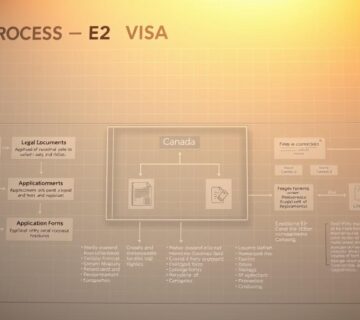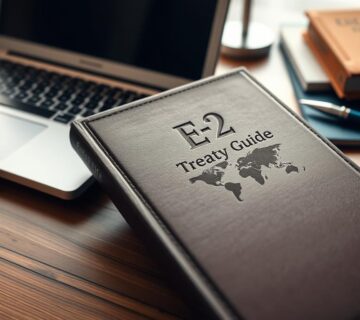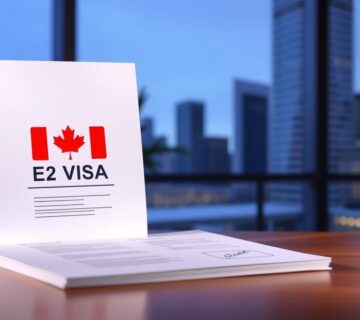Table of Contents
E2 Visa Guide for Canadian Investors
For many applicants, the E2-Visa represents a practical option to expand business interests while maintaining ties to Canada. Many Canadian entrepreneurs and investors look south of the border for opportunities. The E-2 treaty investor visa is a pathway that allows nationals of treaty countries, including Canada, to live and work in the United States based on a substantial investment in a U.S. business.
Who Can Apply?
Investors
- Must make a substantial investment in a real, active business.
- Must own at least 50% of the enterprise or have operational control.
- Must show that investment funds come from a lawful source.

Employees
- May qualify if they work in an executive, managerial, or specialized knowledge role within a treaty investor’s enterprise.
Key Requirements
- Bona fide enterprise – the business must be operational, not speculative.
- Substantial investment – no fixed minimum, but it must be proportionate to the cost of the business.
- More than marginal income – the enterprise must be able to generate sufficient income to support the investor and family.
Step-by-Step Application Process- E2-Visa
- Eligibility Assessment – review of investor status and business viability.
- Form Filing
- Outside U.S.: Form DS-160 (application for nonimmigrant visa).
- Inside U.S.: Form I-129 (petition to change or extend status).
- Fees – As of 2025, the Form I-129 fee is USD $510 (subject to change). Other fees may apply.
- Documentation – business plan, ownership documents, financial records, proof of investment.
- Interview – some applicants must attend an interview at a U.S. consulate.
Processing times vary and can take several months. Applicants should always confirm the most up-to-date requirements on official U.S. government websites.

Common Challenges
- Incomplete or inconsistent documentation.
- Difficulty proving source of funds.
- Underdeveloped business plans.
Thorough preparation can help reduce delays and improve the strength of the application.
Preparing a Strong Business Plan
A business plan is a cornerstone of a successful E-2 visa application. It serves as both a roadmap for your enterprise and as evidence for U.S. immigration authorities that your investment is real, substantial, and economically beneficial.
Key elements of an effective business plan include:
- Executive Summary – A concise overview of the business, investment amount, ownership structure, and strategic objectives.
- Market Analysis – Research on the target industry, market trends, competition, and opportunities. This shows that the enterprise is based on realistic projections.
- Operational Plan – Details of day-to-day operations, staffing, suppliers, and customer acquisition strategies.
- Financial Projections – Five-year forecasts of revenue, expenses, and cash flow, supported by assumptions and evidence. These projections should demonstrate that the business will produce more than marginal income.
- Job Creation – A plan for employing U.S. workers, including anticipated positions and hiring timelines.
- Investor’s Role – A clear description of how the investor will develop and direct the business, demonstrating active control.
A strong, well-documented business plan helps establish the credibility of the enterprise and strengthens the application. It also provides the applicant with a practical guide for managing the business once operations begin.

Maintaining E-2 Visa Status
Securing an E-2 visa is only the first step. To remain eligible, investors must continue to meet the program’s requirements throughout their stay in the United States. Key considerations include:
- Active Business Operations – The enterprise must remain operational and continue to generate more than marginal income. Passive or speculative investments do not qualify.
- Ongoing Control – The investor must maintain at least 50% ownership or operational control of the enterprise.
- Compliance with U.S. Laws – The business must meet all applicable U.S. regulatory and tax obligations.
- Timely Renewals – E-2 status is typically granted in increments of up to two years. Renewal applications require updated documentation showing that the enterprise remains bona fide and financially viable.
- Family Members – Spouses and children must also maintain their dependent status. Spouses may continue to seek employment authorization, while children may study but not work.
Careful planning and record-keeping are essential for maintaining lawful status and ensuring smooth renewals.
How Sohi Law Group Assists
At Sohi Law Group, we assist Canadian clients with understanding and preparing for the E-2 visa process. Our support includes:
- assessing eligibility,
- organizing application documents, and
- guiding clients through the filing process.
Contact us at 833-877-9797 to discuss your situation.

Licensing Information
Immigration law in the United States is federal. Our E-2 visa services are provided by lawyers licensed in [insert applicable U.S. state(s)]. We are also licensed to practise law in British Columbia.
Frequently Asked Questions
What is a “substantial investment”?
There is no fixed minimum. The investment must be large enough to make the enterprise viable and must be “at risk” (subject to business success or failure).
Can my family join me?
Yes. A spouse may apply for work authorization, and children under 21 may study in the U.S.
Does the E-2 visa lead to permanent residency?
No, it is a nonimmigrant visa. However, some investors later apply for other visa categories that may lead to permanent residency.
How long does processing take?
Processing times vary, but it may take several months. Premium processing may be available for certain forms.

Key Takeaways
- The E-2 visa offers Canadian investors an opportunity to develop businesses in the U.S.
- Success depends on substantial, well-documented investment and a credible business plan.
- Careful preparation and legal guidance can help applicants avoid common pitfalls.
⚖️ Disclaimer: This article provides general information only and does not constitute legal advice. Outcomes depend on each applicant’s circumstances and U.S. government decision-making.





No comment